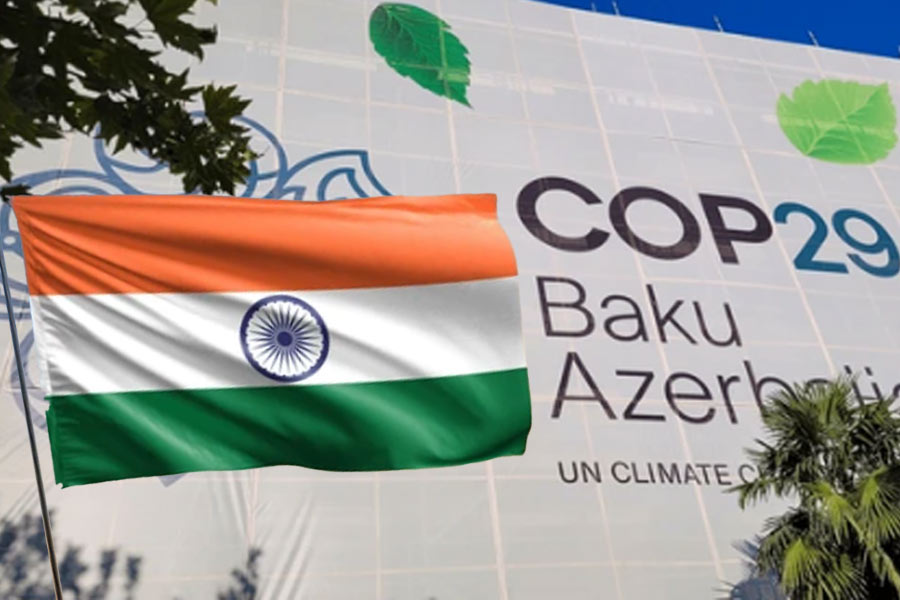The COP29 in Baku is expected to conclude on Friday evening, as the summit enters its final stages.
Early on Thursday morning, a draft proposal for a new, collective, and quantifiable financial goal (NCQG) for developing and vulnerable nations was presented.
The draft, which does not yet have figures from developed countries but several numbers from developing nations, has evoked mixed responses from climate experts.
The 10-page draft with 61 points, the fourth on the issue, is a much-structured and comprehensive one compared to earlier ones. The first of which ran into 35 pages.
A few experts pointed out that the negotiating text has used the report on climate finance prepared by Amar Bhattacharya, Vera Songwe and Nicholas Stern, which was launched by the United Nations Framework Convention on Climate Change (UNFCCC) last week at the Baku summit.
It underlined the need to provide $1 trillion annually by 2030 with half of it to come from cross-border private finance, as the framework with the document having something for both the developed and developing parties.
The latest negotiation draft mentioned options under the heading “Goal Formulation”, highlighting the remaining differences between the developed and developing nations.
One opinion pointed out the decision “to establish a new collective quantifiable goal on climate finance… from 2025-2035 … (to be) provided and mobilised from developed to all developing countries and to address their evolving needs, in grants or grant-equivalent terms… for adaptation, mitigation and loss and damage, to support developing country parties”, but mentioned no amount as the developed countries are yet to put any number on the table.
However, further down the text in the draft, an overall figure in the range of about $5 to 7 trillion for implementing the climate-linked actions committed by the developing and vulnerable countries, called “nationally determined commitments”, have been quoted, though bracketed, meaning the figure has not been agreed upon by all nations.
The draft also mentioned the need to raise $215 to 387 billion for undertaking adaptation, key for developing countries like India. The draft pointed out that $4 trillion per year till 2030 and $4 to 6 trillion after 2030 is required for facilitating the pathway of a low-carbon economy and achieving net zero by 2050, as decided in the Dubai climate summit.
Experts pointed out that to expand the sources to raise climate finance, the draft has focused on “voluntary” as well as “domestic” contributions from developing countries, clearly trying to pass part of the responsibility to China, India and other emerging economies.
It invites “developing country parties willing to contribute to the support … voluntarily”, but assures that “this voluntary support shall not be accounted for in the NCQG”.
The draft points out that “the new collective quantified goal on climate finance will be mobilised through a wide variety of sources, instruments and channels, including public, private, innovative and alternative sources, noting the significant role of public funds”.
Climate experts pointed out that the draft has provided a spectrum of options, but expressed disappointment for the developed countries for not yet committing to any value.
A few negotiators from African countries told The Telegraph that developed countries talking about “$200-300 billion annually in private and bilateral meetings” is nothing less than a joke, as trillions are needed.
“The revised draft text, while more streamlined, presents a spectrum of options — some good, some bad and some outright ugly. It recognises the need to prioritise grants but remains silent on the critical scale of the new finance goal, instead shifting pressure onto developing countries to mobilise more domestic resources,” said Harjeet Singh, a frontline climate activist in Baku.
“Alarmingly, the text lacks clear financial sub-goals for mitigation, adaptation and addressing loss and damage — areas where needs have skyrocketed while resources remain scarce,” added Singh.
“We are disappointed to see no clear NCQG numbers in the draft text that has been streamlined and includes some strong options and good elements. However, our biggest concern is that this text explicitly tries to erode all references to historical polluters’ obligation to pay under the Paris Agreement and is an attempt to prepare the ground for a private sector-led global finance goal with minimal accountability on developed countries,” said Sanjay Vashist, the director of Climate Action Network South Asia (Cansa).
Both the experts termed the remaining part of the summit as crunch time for the survival of the world, especially its vulnerable population, from the clutches of climate change.
“Nobody seems to be fully happy. Various countries or country groups starting from the European Union to umbrella group, including the US, UK as well as the G77 countries, have criticised several parts of the draft, indicating it may be on the right path,” said a climate expert in Baku.
Gutierrez plea
UN secretary general Antonio Gutierrez on Thursday urged negotiators in Baku, where he reached directly from the G20 summit in Rio, to strike a balance between their respective initial positions. He called upon the climate negotiators at the UN climate summit at Baku to move from their initial position to a new ambitious financial goal to fund climate action. “Many substantial differences are still remaining. Success is not guaranteed yet. A push is required to reach consensus and failure is no option,” Gutierrez said.











